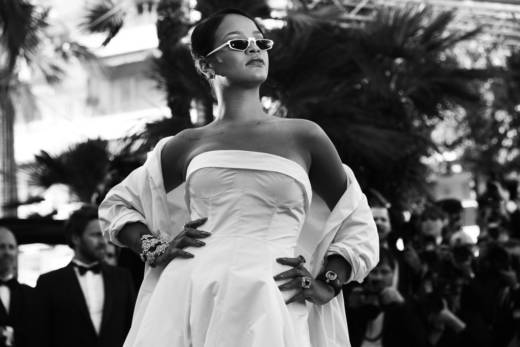In case it wasn't already abundantly clear, this week proved yet again that, when you mess with Rihanna, she will mess with you back. After being trolled by an attention-seeking sports blogger who asked “Is Rihanna Going to Make Being Fat the Hot New Trend?,” the singer took to her Instagram on Monday with a response that succinctly highlighted the double standards for famous men and women, while also letting the world know that her self-love was very much intact.
Rihanna and Halle Berry Don't Have Time for Fat-Shaming Nonsense

Rihanna's followers were thrilled. "You give all of us women soooooooo much strength," commented @rightfulowner. "girl..." @street.style.zap posted, "you look amazing... you are a goddess regardless what size you are at... some women... included me... can be hot at a size 4 and hotter at a size 10... it is not about the size its about attitude and security..."
Halle Berry was put in a similar position last week, having had the world's media speculate on whether or not she was pregnant, based on a red carpet appearance in which she held onto the tiniest of curves in her belly region. The actress set the record straight on Instagram in the funniest way possible:
Berry and Rihanna follow an increasing number of female celebrities who will not sit by quietly while their bodies are under attack. Kate Winslet was one of the earliest examples, loudly objecting to Photoshop ever since GQ magazine changed the shape of her legs for a 2003 cover. Most recently, it emerged that Winslet's contract as a L'Oreal spokesperson impressively includes a “no retouching” clause.
Keira Knightley and Jamie Lee Curtis have also both taken steps to reclaim their body images, using stark photo shoots. Knightley, sick of having her breast size increased in photos, appeared completely topless in a 2014 issue of Interview magazine. Curtis went make-up and Photoshop-free for a refreshing 2002 More shoot.
In a fit of typically glorious outspokenness, Lady Gaga took the opportunity of winning an award at the 2013 Glamour Women of the Year Awards to scold the magazine for Photoshopping her too much. "What I want to see," Gaga told Glamour from the podium they had provided her with, "is the change on your covers... When the covers change, that's when culture changes." Adele wasn't quiet when Karl Lagerfeld fat-shamed her in 2012 either, saying: "I've never wanted to look like models on the cover of magazines. I represent the majority of women and I'm very proud of that."
These days, even our teen stars are stepping up to battle. In 2015, Zendaya used her Instagram account to object to being Photoshopped, and Lorde has posted super-honest pics about her acne on more than one occasion.
What all of these famous women have in common is a knowledge that when they are body-shamed, it trickles down to every woman in the country. In 2010, Glamour magazine conducted a survey about their readers' body images. The results were startling: 71 percent of the respondents said they felt fat, even though official obesity rates for women between the ages of 20 and 39 that year were actually closer to 31 percent.
It turns out that creating rampant insecurity in women and girls is a real money-maker. Consider the fact that 85 percent of the people supporting America's $20 billion diet industry are women. Consider the fact that the creator of Spanx—undergarments designed to flatten stomachs and tighten thighs—is worth an estimated $1 billion now.
For the average woman in the street, body insecurity is the result of a lifetime of social conditioning. Fat-shaming can begin as early as elementary school, and peer pressures only increase further for teenagers. Advertising, as well as the fashion, beauty, and dieting industries all play a role in making women of all ages feel inadequate and overweight. As does the dissection and analysis of celebrity bodies in the nation's tabloids—losing "baby weight" has practically become a competitive sport at this point.
When our famous women are made vulnerable by excessive criticism and over-zealous retouching, it can knock the security of millions of women across the country. So when our heroes offer examples of how to fight back, it enables and empowers average women to do so as well. The more celebrities that follow Rihanna and Halle Berry's examples the better.

